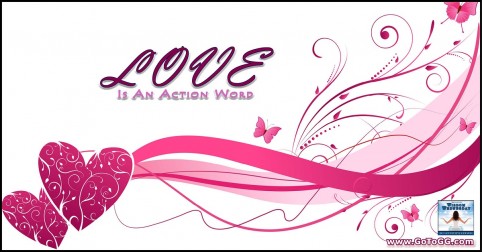LOVE is an Action Word
As I am sitting in meditation pondering what to write and teach about, I realize that many people in the world do not understand the relationship between loving as a feeling and love that makes life an exciting and amazing exploration of relationship and togetherness.
The phrase “love is an action word” came into my mind attached to a myriad of lessons and impressions about love and loving.
I shall try to unravel and share the wisdom and implications of this revelation with you today, lessons about love.
Love in action takes love from being just the emotions of love, into being a guide for your love relationships.
It supports and encourages your loved ones in coming into the fullness of their being. It supports their journey, even when it goes in a direction you may not personally desire.
Love is, of course, a powerful and dynamic force that has the power to transform your life and fill you with incredible joy and fulfillment.
Certainly “falling in love” is a peak experience in anyone’s life. For some love lasts a lifetime as cherished support that permeates their lives.
However, for others love becomes a source of agony, riddled with pain and sorrow, marked by disappointment and betrayal.
Love is certainly a complex emotional energy-riddled with a great many differing aspects. Although it is perhaps one of the most important issues in life, it is something that everyone assumes you know how to do.
In my experience, and my many years of teaching and coaching people to have a happy and successful life, I have realized that there is much about love that is not easily understood.
My meditations, and I hope my writings, will open you to a new way of considering love.
What It Means To Love
The very word love has so many variations to it that ancient Greeks divided love into multiple words.
Here is what Wikipedia says about these Greek love words:
Agápe means “love: esp. brotherly love, charity; the love of God for man and of man for God.” Agape is used in the biblical passage known as the “love chapter,” 1 Corinthians 13, and is described here and throughout the New Testament as brotherly love, affection, goodwill, love, and benevolence.
Éros means “love, mostly of the sexual passion.” The Modern Greek word “erotas” means “intimate love.” It can also apply to dating relationships as well as marriage. Plato has Socrates argue that eros helps the soul recall knowledge of beauty, and contributes to an understanding of spiritual truth, the ideal “Form” of youthful beauty that leads us humans to feel erotic desire – thus suggesting that even that sensually based love aspires to the non-corporeal, spiritual plane of existence; that is, finding its truth, just like finding any truth, leads to transcendence.
Philia means “affectionate regard, friendship,” usually “between equals.” It is a dispassionate virtuous love, a concept developed by Aristotle. Philia is expressed as loyalty to friends, family, and community, and requires virtue, equality, and familiarity.
Storge means “love, affection” and “especially of parents and children.” It is natural affection, like that felt by parents for offspring.
Unfortunately, in modern society, we only have one word that is supposed to fit all forms and aspects of love and we have romantic books, films and media products that seem to go out of their way to define love in a way that creates unrealistic expectations about what it means to love.
All too often, this fairy tale fantasy about love leads to the expectation and belief that when you love someone they want exactly what you want, that in some way doing what you need gives them what they need. This fallacy leads to many broken hearts…
